News & Media
African integration in the spotlight at Unisa
The Thabo Mbeki African School of Public and International Affairs, at the University of South Africa, hosted a seminar titled "Why integration is the wrong agenda for Africa" on 6 June 2025. Dr Chidochashe Nyere delivered the main presentation. Ambassador Dennis Thokozani Dlomo and Prof Eddie Maloka were the two respondents. Members of the Diplomatic Corps, Unisa academics and students attended the seminar. The seminar critically examined the limitations of Africa’s integration agenda as envisioned at the founding of the Organization of African Unity (OAU) in 1963, which was restructured into the African Union (AU) in 2002.
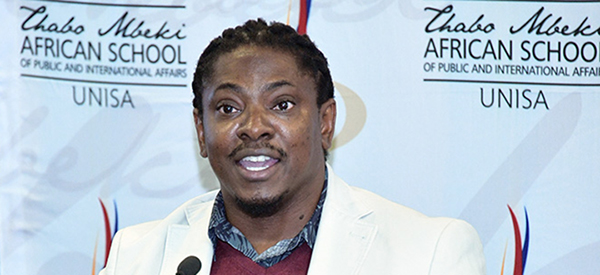
Dr Chidochashe Nyere is a postdoctoral fellow at the Thabo Mbeki African School of Public and International Affairs, University of South Africa
Today, the AU’s rallying point is Agenda 2063, marking the centenary of Africa’s premier institution, which was established to realise continental unity. However, the dream of African unity has yet to be fully realised. While the OAU and the AU have achieved notable successes, most significantly in the fight against colonialism, Africa still has a long way to go in attaining meaningful unity. Over the years, the coming together of African countries has often been misconstrued as integration. The concept of integration is problematic for Africa because it implies merging two or more separate entities. Africa, though diverse, has always been one. Applying the term "integration" to a single entity is semiotically, epistemologically and ontologically flawed. As an alternative, the notion of "re-member-ing" was proposed at the seminar. This concept acknowledges the singleness or oneness of an entity that needs to regroup its fragmented parts.
Why integration is the wrong agenda for Africa – Dr Chidochashe Nyere
Historical context: from the Organization of African Unity to the African Union
On 25 May 1963, the Organization of African Unity (OAU) was established to unite Africans in their struggle against colonial rule, apartheid and all forms of domination. By the late 1950s, Africa began the process of decolonisation, and European countries that had colonised Africa gradually relinquished power to native African leadership. Africa was relatively successful in the fight against colonialism. After the demise of colonial rule and apartheid, the OAU transitioned into the African Union (AU) in 2002. The AU adopted a new focus: achieving African integration and economic development. Despite this transition, the vision of African unity has not been fully realised.
Integration
Integration implies merging multiple entities or states (in this case, African states) into a unified whole (the African Union), which is often associated with political or economic unification. Terms like "amalgamation" are used to describe this process, but they presuppose the existence of shared values that are often vague and undermined by the legacy of colonial fragmentation. The coming together of Africans cannot be termed "integration", because it suggests that Africans are still dominated, captured and defeated by colonial structures. To accept that Africa is inherently not unitary is to acknowledge and endorse the colonial project, which, naturally, we repel.
The legacy of colonialism and coloniality
Colonialism dismantled existing African systems, societies and sovereignties. Though formal colonial rule has ended, it left behind something equally sinister – coloniality. This refers to enduring patterns of thought, knowledge, action, power, language and being, among other manifestations of colonial-like structures. The dominance of European languages such as English, Portuguese and French in African governance is a clear example of such colonial mimicry.
To move forward, it is imperative that we analyse the integration agenda through lenses not shaped by colonialism or coloniality. The coming together or unification of Africans can best be understood as the re-member-ing of Africa. This implies that Africans frame African global history according to how they view and understand themselves. This concept recognises Africa as a singular, though fragmented, entity. Re-member-ing is not just a recollection of memory but a conscious act of restoring Africa's ontological being, thus negating the negation imposed by colonialism. The process of re-member-ing seeks to reconstruct Africa’s identity, but it is undermined by global coloniality and persistent colonial mentalities and systems.
Global coloniality continues to shape African governance, education and economic models. The integration agenda itself emanates from European interactions with Africa and historical events like the 1648 Treaty of Westphalia (which defined the modern nation state) and the 1884-1885 Berlin Conference (which partitioned Africa without African involvement). These events laid the foundation for Africa’s artificial borders, which now require Africans, as separate African countries, to integrate. The philosophical argument put forward at the seminar was that the integration agenda should be rejected to counter the narrative that Africa is divided, since the division was not of Africa’s choosing but imposed by European colonialists. Global coloniality continued to be operationalised after 1945, when Africa was absorbed into the global capitalist and liberal system, with limited space to define its own developmental path.
At the founding of the OAU, two competing visions emerged. One group, led by Kwame Nkrumah of Ghana, called for a united Africa. Another group, led by Mwalimu Julius Nyerere of Tanzania, supported gradual unification through regional economic communities (RECs). Neither vision has fully materialised. Though popular, the REC model has proven problematic and hindered Africa's collective unity.
Efforts like the Lagos Plan of Action and the Abuja Treaty aimed to foster integration but failed to overcome deep divisions among African states. In addition, instruments like the Universal Declaration of Human Rights, while noble in intent, are often criticised for their Eurocentric standards and selective application. Similarly, though promoting human rights and development, the AU Constitutive Act and related treaties still reflect colonial frameworks by reinforcing national borders and donor-driven agendas. As the OAU/AU approaches its centenary, African unity remains elusive. The AU’s integration agenda is limited by fragmented RECs, weak policy implementation and persistent external influence.
SADC integration
Challenges of SADC integration
The Southern African Development Community (SADC) developed a 10-year plan to accelerate regional integration. However, the SADC’s integration agenda borrows heavily from the European Union (EU) model, reflecting an externally imposed framework rather than one rooted in African realities. This Eurocentric approach fails to account for Africa’s historical, political and social contexts, and has inadvertently reinforced divisions among African states instead of uniting them.
The SADC model mirrors the EU’s economic integration template, which may not be suitable for Africa due to fundamental differences in historical experiences, institutional development and socio-political foundations. Consequently, instead of fostering solidarity, this framework often creates artificial competition and division between African states, ultimately undermining regional unity.
Re-member-ing Africa: reclaiming identity and agency
True integration requires a process of "re-member-ing" Africa – a political, economic and cultural coming together that restores African identity, thought systems and institutions. Africans must assert their own ontology (ways of being) and epistemology (ways of knowing) by building systems rooted in African experiences. This includes establishing self-financing African agencies and institutions, rather than relying on external donors whose support often comes with conditions that shape and constrain African agendas.
Economic re-member-ing: the AfCFTA opportunity
The African Continental Free Trade Area (AfCFTA) offers a practical pathway for economic re-member-ing. Intra-African trade must become the norm and must be supported by the removal of trade barriers, tariffs, unnecessary border costs and even the borders imposed during colonialism. African countries should use the AfCFTA as a platform to strengthen continental and regional production, connectivity and shared prosperity. As global powers like China assert sovereignty over data, markets and economic models, Africa cannot afford to remain fragmented. A united Africa is essential for effective competition and negotiation in the international system.
Recommendations
- Unify Africa’s voice on global platforms through coordinated positions in institutions such as the United Nations (UN), the World Trade Organization (WTO), the International Monetary Fund (IMF), the Group of 20 (G20) and BRICS.
- Establish unified continental governance, security and economic structures to consolidate state capacity and to enable the pooling of sovereignty.
- Reject externally imposed models of integration and instead design a model grounded in Africa’s own realities, cultures and developmental needs.
- Leverage the AfCFTA to drive industrialisation, strengthen value chains and expand digital trade across the continent.
Respondents
Ambassador Dennis Thokozani Dlomo: Integration must be grounded in African values
Precolonial Africa thrived through collaboration and community-oriented systems long before the colonial state disrupted these practices. Dr Julius Nyerere, though instrumental in shaping pan-African thought, missed a critical component in his integration framework by not explicitly rooting it in African value systems. African integration must begin with shared values, Ubuntu, communalism and mutual respect, which represent the essence and foundation of African identity.
Security and self-determination
Security begins with awareness: understanding Africa’s unique context, vulnerabilities and agency is the first step toward developing appropriate systems. Africa must create mechanisms informed by African realities to protect its interests and sovereignty. For example, the formation of African intelligence institutions in response to foreign interference and threats embodies African solutions to African problems. Africa remains the only continent with a clearly articulated continental agenda, Agenda 2063, which reflects a shared vision and commitment to integration.
Prof Eddie Maloka: Interrogating the foundations of integration
Rethinking integration
Contrary to popular belief, integration as a political project did not originate in Europe but in the Americas, particularly through the drafting of the Constitution of the United States of America (USA) in Philadelphia. However, European settlers in the Americas advanced the integration agenda. Figures like Simón Bolívar envisioned a united Latin America, though this project only materialised in the USA. In Africa, Kwame Nkrumah drew inspiration from this American project during his time with George Padmore and CLR James, shaping his call for pan-African unity must unite. Interestingly, Europe only embraced integration after World War II.
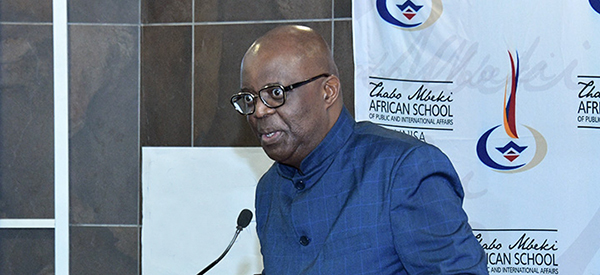
Prof Eddie Maloka is a visiting professor at the Institute for Pan-African Thought and Conversation, University of Johannesburg
Africa’s integration journey
Despite criticism, Africa’s integration efforts have been more successful than those attempted in the Americas or Europe. The establishment of the AU and its functioning organs is a significant achievement. However, the narrative that only colonisers partitioned Africa is incomplete. A second wave of partitioning occurred during independence, when African nationalists rejected federations proposed by colonial powers (eg in Central Africa) and instead opted for smaller, individual nation-states. African nationalists, in some cases, reinforced the partitioning of the continent by dismantling proposals for unity.
Westphalian state and its relevance to Africa
Though problematic, the Westphalian model of state sovereignty remains the dominant global framework. The challenge for Africa is not to reject it outright but to adapt it to serve African unity and development. Just as pap, a European-introduced food, has become part of African identity, structures once imposed upon African states can be adapted and reappropriated. Nkrumah argued that geography, not ethnicity or history, defines Africanness – an inclusive vision aimed at uniting rather than dividing.
While the concept of the Global South may fade, Africa’s resilience depends on moving beyond victimhood toward self-reliance and continental self-determination. Prof Maloka contends that African integration must be decolonised at its core – intellectually, institutionally and culturally. This means starting with African values and identity as the foundation, reclaiming historical narratives, learning from both successes and missteps, designing systems that reflect African realities rather than imported frameworks and strategically using global structures like the Westphalian state to advance African interests.
* By Dr Chidochashe Nyere, postdoctoral fellow, Thabo Mbeki African School of Public and International Affairs, University of South Africa
** Photography by Shooheima Champion, Multimedia Centre
Publish date: 2025-06-13 00:00:00.0


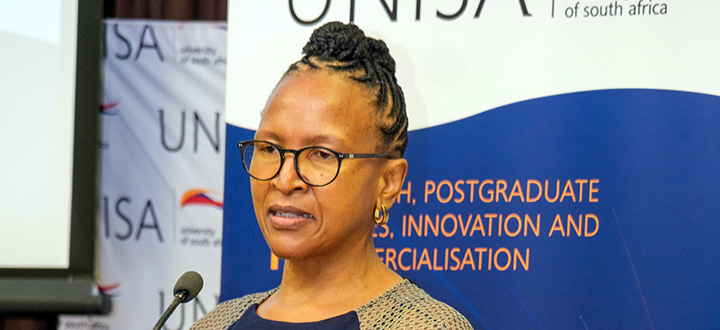 Study finds black men underrepresented in public healthcare facilities
Study finds black men underrepresented in public healthcare facilities
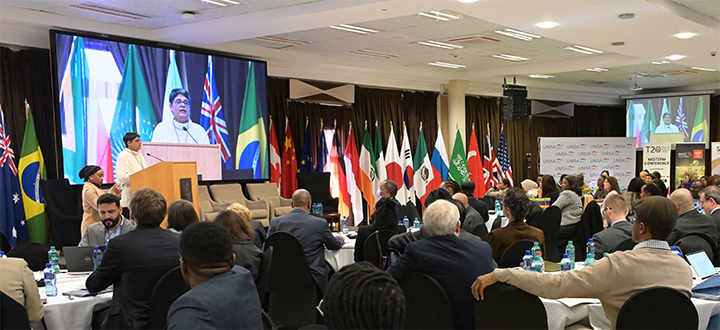 World's foremost thought leaders converge on Unisa
World's foremost thought leaders converge on Unisa
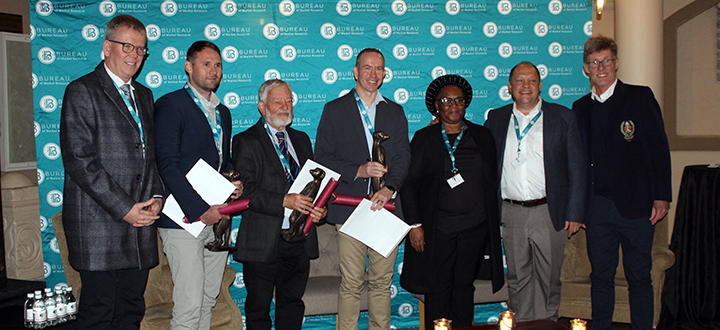 BMR and Unisa announce Economist of the Year 2024 winners
BMR and Unisa announce Economist of the Year 2024 winners
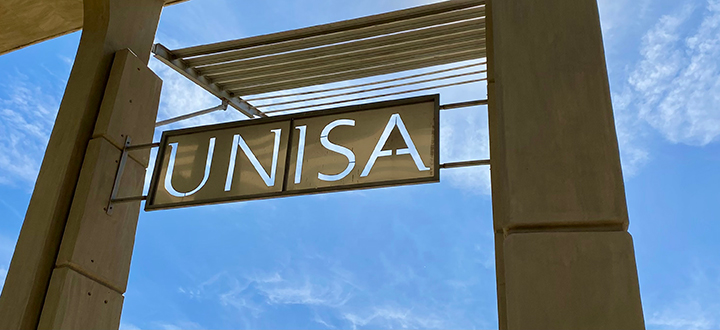 Unisa improves its position in the Times Higher Education University Impact Rankings
Unisa improves its position in the Times Higher Education University Impact Rankings
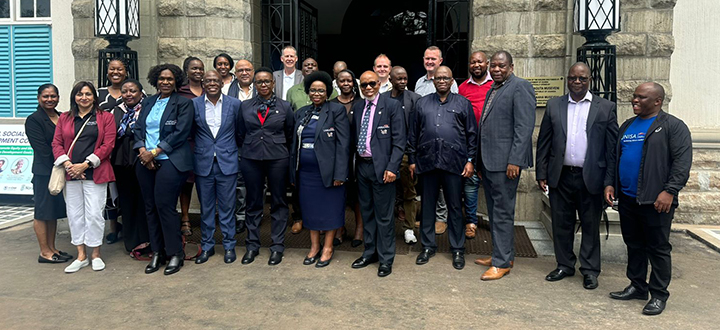 Unisa solidifies ties with Uganda’s largest university
Unisa solidifies ties with Uganda’s largest university